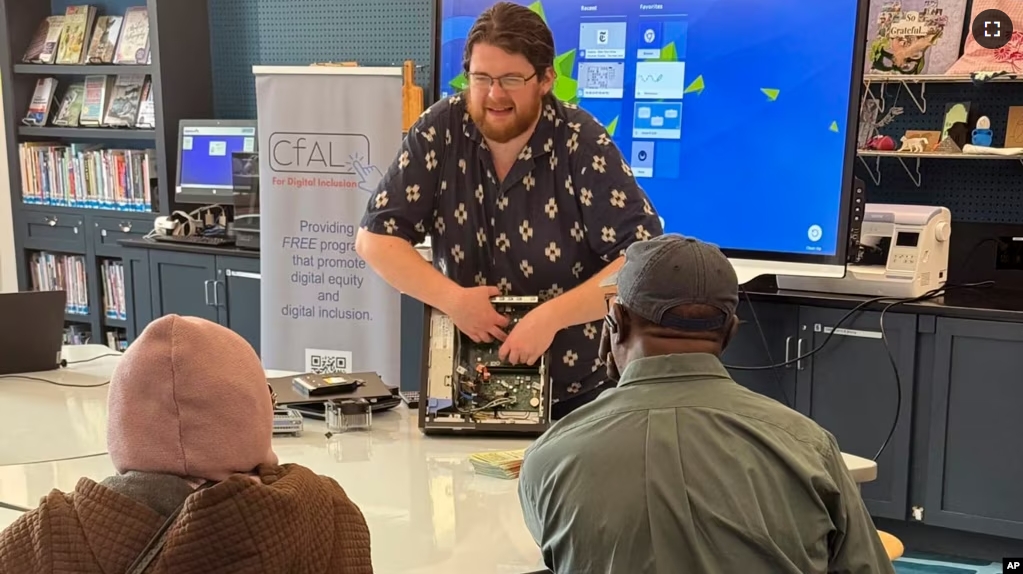Artificial intelligence (AI) tools continue to expand in the workplace. And some U.S. states have launched specialized programs to train workers on how to deal with the new technologies.
Many industries are expected to heavily depend on a series of tools known as generative AI. This technology includes systems designed to perform many jobs currently done by humans. Such systems have become increasingly smarter in recent years.
In Connecticut, officials have been working to create what they hope will be the country’s first Citizens AI Academy. This will be a free, online collection of special classes designed to teach basic AI skills and provide certifications needed for employment.
Connecticut Democratic Senator James Maroney told the Associated Press that AI changes in the workplace are happening very quickly. “So we need to all learn what are the best sources for staying current,” he said. “How can we update our skills? Who can be trusted sources?”
Gregory LaBlanc is a professor of Finance, Strategy and Law at the Haas School of Business at Berkeley Law School in California. He says workers should be taught how to use and manage generative AI.
LaBlanc said he thinks it makes more sense to center on teaching ways to support AI “as opposed to learning to be really bad imitators of AI.” He added that employees should be trained in areas where AI does not perform well so that workers can make up the difference.
This year, at least four states proposed legislation that sought ways to deal with AI in the classroom. Those states included Connecticut, California, Mississippi and Maryland.
One bill in California would require a state working group to consider including AI literacy skills in math, science, history and social science studies.
The writer of the bill is California Assemblyman Marc Berman. He said in a statement that AI offers the possibility to improve parts of our lives. “But only if we know how to use it, and use it responsibly,” he added.
Berman noted that all students should be taught about basic AI elements and systems. He said students should also learn “the skills to recognize when AI is employed…”
In Connecticut, Senator Maroney said his state’s planned AI Academy will also aim to provide studies on AI basics. He noted the importance for people to have the skills to understand, examine and effectively interact with a range of AI technologies.
A study released by the job-search company Indeed found that all U.S. jobs listed on the service had skills that could be performed or improved by generative AI tools.
Nearly 20 percent of the Indeed job listings were considered “highly exposed.” This means the technology is considered good or excellent at 80 percent of the skills the jobs require. Nearly 46 percent of jobs on the service were “moderately exposed.” This means that AI tools can perform 50 to 80 percent of the skills.
Maroney said he is concerned that AI will worsen existing equity problems related to a lack of high-speed internet, computers and smart phones in some underserved communities. Inequities have been identified between more digitally literate people, often living in cities, and those living in more rural areas without dependable internet and modern devices.
Marvin Venay shares that concern. He is with the Massachusetts-based group Bring Tech Home Advocates. The group has been working for years to narrow differences in computer literacy and high-speed internet availability.
Venay said, “Education must be included in order for this to really take off publicly…in a manner which is going to give people the ability to eliminate their barriers.”
Venay added, “And it has to be able to explain to the most common individual why it is not only a useful tool, but why this tool will be something that can be trusted.”
I’m Bryan Lynn.
The Associated Press reported this story. Bryan Lynn adapted the report for VOA Learning English.
Quiz – US States to Train Workers on AI in Workplace

Start the Quiz to find out
__________________________________________
Words in This Story
certification – n. the process of earning an official document that serves as proof of certain skills
update – v. to add new information to something
imitate – v. to behave in a similar way to someone or something else
literacy – n. knowledge of a particular subject
expose – v. to put someone at risk from something harmful or unpleasant
eliminate – v. to remove or take something away
